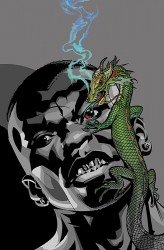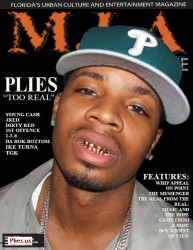
Archive for February, 2009


Something Jumped Out At Me From The Battle For The Cowl Promo Image.
February 7th, 2009 Posted by Esther Inglis-Arkell
Black History Month ’09 #07: These Are Your Shoes, These Are My Shoes, We’ve Got Issues
February 7th, 2009 Posted by david brothersTalking about black characters in comics puts me in mind of the old joke about newscasters. If they mention an armed robbery and not the race of the crook, it’s obviously a white guy– they would’ve said the race if he wasn’t. This is because being black is Different. It’s something outside of the norm. Basically, to put as blunt a point on it as possible, it’s The Other.
Once you create a book with an all, or mostly, black cast, and you acknowledge their race, marketing and advance word of mouth is given a chance to play up that aspect of the book, no matter how much it plays into the content of the book.
This is what happens when you treat black characters as special snowflakes. This is what happens when so many black characters have to address Racism, or The Streets, or The Struggle, or The Man at some point in their career. You begin to build certain expectations in your audience. You’re waiting for that bit of the book where you get hit over the head with race.
Before The Crew came out, Christopher Priest was already fighting the idea that it was a Black Book.
I briefly wanted to call this book The Black Avengers. It’s a terrible idea, but, the truth is, with this cast, race will speak the loudest. Having not said a whole lot about what this book is, the feedback I’ve gotten thus far has only confirmed that fear. Fans don’t know what THE CREW is, but they know it’s, “A black book set in the ghetto.” So, I figured, why not. Race is all some fans will see anyway, let’s just get to it. The book has a kind of Avengers vibe, anyway, with two archetypical AV characters in our black Iron Man (WAR MACHINE) and Black Captain America (JUSTICE). Moreover, Black Avengers really just nails What This Is in a way “The Crew” really can’t.
It’s kind of funny. If Christopher Priest had replaced the gangs in The Mog with, say, Hydra, you could’ve branded The Crew as The Avengers: The Crew and had the kind of story Hawkeye used to star in. With black heroes up against black gangs, though, it’s a Black Book.
This is essentially what I’m trying, and have been trying, to get at. Books featuring a cast of largely black characters become almost inherently political. They’ve got to be about Black People, rather than about adventures. No, that’s wrong. They seem like they have got to be about Black People, rather than adventures. It’s that perception and prejudice again thing- we’re trained to expect certain things out of these books.
Admittedly, I’m working from a small sample size here, and that’s part of the problem. Talking about this sort of thing is tough when you can only point to a fistful of books for examples. How can you talk about reasonable or offensive portrayals when your sources are lacking? We haven’t had enough books starring black characters to erase the idea that Black Books are always something to be gawked at or treated as a big deal.
The books, and characters, aren’t abnormal. Get your hands dirty, put them through their paces, and make them commonplace. I’m pretty happy about Luke Cage being in New Avengers, in part because that’s the highest profile position for a black comics character since Steel became one of the four fake Supermen over a decade ago. It’s a step in the right direction, at the very least.
I don’t want it to seem like the market should suddenly be flooded with dozens of black people, each with a different gimmick and backstory. You don’t have to “blackify” comics. At the same time… the more black characters there are, the fewer characters there are that will be expected to be official representatives of the race. You’ll have more variety, more characters to identify, and a wider range of experiences.
So, there it is. Nothing’s ever simple, right?

Infinite Jest
February 6th, 2009 Posted by Esther Inglis-ArkellA short while ago, I spent time brainstorming, trying any idea for a superhero or superhero team that I could think of. I came up with octogenarians and toddlers, humans, animals, plants, outsiders and pageant winners, religious devotees and atheists, geniuses and halfwits. I think I got a good cross-section of humanity, but there was one characteristic that all of the characters had; a smart mouth.
It occurs to me that one of the most common element in superhero comics is humor. Whether it’s the grinding cynical humor of The Boys, the quips that seem to follow Gail Simone’s characters wherever they go, the screwball humor of the Booster Gold and Ted Kord, the flat-out parody of The Tick, or the cutesy silliness of the Tiny Titans, almost every book has it.

Black History Month ’09 #06: The Fear of Mandingo
February 6th, 2009 Posted by david brothers(apologies for this post going up almost six hours late– i’d had it scheduled for tomorrow for some reason!)
One thing you can’t help sometimes is looking at black characters with a critical eye. Do they measure up to whatever standard of quality that black characters have to meet? Are they stereotypes? Are they insulting? It’s not even an intentional thing, sometimes. It’s part of that same line of thinking that leads to idle thoughts like, “Man, there weren’t any black folks in that movie” or “I was surprised the black guy didn’t die first.”
Barracuda’s one of those characters that you can call “problematic.” “Stereotypical.” “Ignorant.” “Racist.” He was created by Garth Ennis in the pages of Punisher MAX in a story about corrupt businessmen. The businessmen hired him to get rid of a couple of problems before they unveiled their big scheme.
Barracuda is essentially the essence of the mandingo: hypersexed, hyperviolent, and just waiting for a chance to put his hands on everything you hold dear and taint it. He is every “black male” on your evening news, every “big black guy” your friend ever told you about fighting, every bogeyman who ever broke into your house or stole your car, and every dude that ever made your mother clutch her purse in an elevator. You remember all those stories about the Superdome after Katrina? He was behind all of it. He’s even built like a big gorilla, all muscles and glower.
The problem is that Barracuda is probably the best black villain in years. That may be damning with faint praise, since I can’t think of another single significant black villain in mainstream comics, but it’s still true. He’s appeared in a total of three stories since his inception, the last of which ended with his death.
Frank Castle’s entire gimmick, at least under Ennis (a.k.a. “The Good Stories”), is that he’s singularly focused and prepared for his war on crime. He’s using his Vietnam-era training to put criminals to bed. Barracuda is also a vet, but he’s coming from Reagan’s wars in South America, rather than Vietnam. He found a taste for money, now his skills go to the highest bidder.
At first glance, Barracuda is just another big dumb tough guy, but that isn’t correct at all. He’s extraordinarily quick-witted and resilient in addition to being one of the meanest men alive.
He got a standalone story of his own that showed what happened between his beginning and his end. It was, what, a dark comedy? It showcased a morbid sense of humor and obscene levels of violence. It also showed even more of Barracuda’s character. His lack of social graces was obvious beforehand, but the series makes it clear that he’s full of pride. Frank Castle embarrassed him and hurt him and he can’t let that stand. So, he takes a trek down to South America to stage a coup and stack cash so that he can finance his revenge. He manipulates what, three or four different factions into all-out war? All on his own? Barracuda is no joke.
Barracuda is a big ball of negative stereotypes, but, man, he’s positively a breath of fresh air. We’ve got a comics world with a squeaky clean Luke Cage, a character born out of the blaxploitation tradition. Sure, sometimes he speaks in ASCII characters, but he spends the rest of his time doing things like being faithful to his wife, worrying about his daughter, and trying to make the world a better place. What part of the game is that?
Ennis creating an unapologetically negative and vicious black villain who isn’t some super scientist or freak of nature is a brave move, since most people don’t seem to have bothered. Ennis dives in with relish and man, it pays off big time. You get an interesting and exciting villain, someone who can actually stand up to the hero of the book, and a story that, even though you know Barracuda is going to bite it because he’s going up against Frank Castle, is thrilling nonetheless. “The Long, Cold Dark” was a story that took both characters to the edge in a way that you just don’t see often enough in mainstream books. You know that it’s going to end messy, but the devil’s in the details.
So here’s to Barracuda, an excellent example that we all cannot be, and should not be, Robbie Robertson when it comes to comics. Drop the kid gloves and give me a savage every once and a while. If I can’t get a savage, at least let me get a Bodie.

Random Thoughts Before Comic Con
February 5th, 2009 Posted by Gavokhermanos already left for the east coast yesterday. I’m about to get some sleep before trekking into New York tomorrow. If for some crazed reason you actually recognize me, feel free to say hi. Unless I’m at the urinal. Then it’s just weird.
Hopefully enough interesting stuff will happen that I’ll have a nice write-up for when I’m done. In the meantime, here are some random thoughts on things:
– Like with every year, I take a week off from work to go to Comic Con. That way I get a day off to prepare, as well as three days after the con to relax. This is especially a good thing because where I work, Barnes & Noble, we’re set to have a book signing by Kate Gosselin (of Jon & Kate Plus 8 fame). It was set to be on Tuesday, but just got postponed a day. Not only am I escaping the horrors of having to deal with that book signing, but I’m also escaping a day of angry people wondering where the hell Kate Gosselin is. Phew.
– Speaking of work, we’ve started playing the latest Springsteen album. There’s this song called Outlaw Pete and I swear I can’t listen to it without hearing Kiss’ I Was Made for Loving You. One trip to Google and it appears like the internet agrees with me. Knew I wasn’t crazy.
– How great is the cliffhanger retcon reveal in Secret Warriors #1? You know what rules? Rereading What If the Punisher Became an Agent of SHIELD. Bendis has inadvertently made that comic even more awesome.
– Even though he won’t be around, hermanos will still have his Black History posts up day by day.
– Click the image to see how Final Crisis #7 really should have ended.
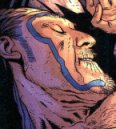
– I haven’t played around with MUGEN for years, but damn if this isn’t well done.
Back in a couple of days. Be good to each other.

Black History Month ’09 #05: Make the Cipher Complete
February 5th, 2009 Posted by david brothersYou know, this is one of those things that I’ve seen over and over, but have trouble coming up with specific examples for.
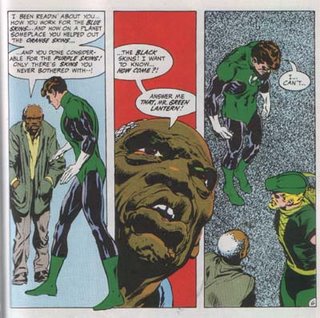
I’m sure you know just what I mean, though, and it isn’t exclusive to black characters in comics. It’s that bit where, say, a white man rebukes a black person, or a woman, or an asian person, or someone who is white, but maybe not rich, and then the white guy gets a face full of “Well, I don’t know where YOU’RE from, but around here…” or “You don’t know how it is!” It’s that scene where a person thinks some variant on “As a ______, I have to work twice as hard!” or “I have to show these people that I’m just as good as they are, even though I’m _____!” I don’t know if you read it, but Huntress Year One was riddled with that kind of thing.
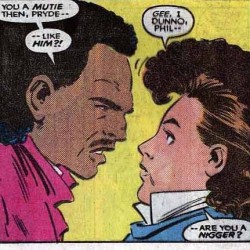
I totally understand the motivation behind the idea. I’ve been given advice that amounts to “People are going to hate you for who you are, so you better work twice as hard.” It’s a common train of thought that comes from being in a situation where you’re the underdog.
However, it got super old pretty quickly. I’ve been thinking of it as “The Big Getback.” “Finally!” whichever character is thinking to himself, “I get to show this white guy that he doesn’t know anything about being a black guy! I get to throw all the injustice of the past four hundred years right into the face of my oppressor!”
Uh, then what?
What happens after that? After the character gets his getback, it’s like a little book is closed. “This character has gotten revenge for racism, and now we can move on to stories about other things.” Captain Marvel has shown those racist sexist pigs that she can beat them up with lasers, Luke Cage has gotten all up in whitey’s face and yelled, and Superman has been told off for not looking out for the people in Suicide Slum and has looked a little chagrined. Ladies and gentlemen, we have spat in the face of racism and can now move on to other stories.
It’s a little silly, really. It’s cheap catharsis. What does it really bring to the story, except “Racism exists and sometimes people get angry about it?” That sort of thing is obvious. It just seems cornier and cornier every time it happens. It’s another symptom of “black characters are special.” “Let’s hit this checklist of Black Issues so our characters will feel authentic!” “Look man, black people got it hard! Let’s hit these marks!”
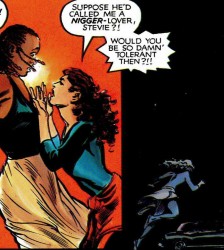
And no, I don’t know what’s up with Kitty Pryde, either. Easiest examples for me to find.

Secret Six Discussion Part II
February 4th, 2009 Posted by Esther Inglis-ArkellOof. Why do I always get to the store late when something huge happens?
Don’t look below the cut if you don’t want to get spoiled for Secret Six #6.

Black History Month ’09 #04: Never No In-between
February 4th, 2009 Posted by david brothersAnyway. New King Kong. It’s not so good. You probably heard that from, y’know, the rest of the world.
They get to Skull Island where savages feed virgins to King Kong. And, while remaining faithful to every aspect of the ’33 Kong, bajillionaire director Peter Jackson populates the place with, as our fisherman in Casanova calls the citizens of Coldheart, “ooga booga bone-nose nigger savage motherfuckers.”
Now, I’m about as sensitive to race issues as the next middle-class white guy. But- really, Peter? Really? That’s the best you could do? You can show us the monkey and the girl ice skating in Central Park but you can’t manage to update the D.W. Griffin-level of stereotypical Savage Nergro Monster? Were there no assistants or friends, colleages or freakin’ P.A.s that took his Grande Hobbitness aside to point out that, hey, maybe we’re spending two hundred million dollars and short of top hats and canes, we’ve just filled Skull Island like it was the Isle of Misfit Al Jolsons?
It wasn’t re-envisioning, re-mastering, reinventing, or re-presenting anything but bigotry; Jackson and co. trucked in racism and wrote it off as an act of fidelity and faithfulness to flawed and ignorant source material.
And anyway it just pissed me off. So when, a few months later, I read about North Sentinel Island for the first time, the two thoughts collided with one another.
Fuck that guy. Here are savages to save the world.
-Matt Fraction, Casanova #5 (back matter)
I can’t help but feel like Matt Fraction, though obviously well-intentioned, missed the point.
Black Panther has Wakanda. Superman’s got Vathlo Island. Tyroc has Marzal Island. Casanova has Coldheart. They all have a few things in common. Remote or isolated countries filled with technologically advanced black people, untouched by the evils of colonialism.
If I had to put my finger on it, I guess it’s born from some kind of political correctness gone wrong. In an effort to avoid creating stereotypical black or African savages, the creators overcorrected in the opposite direction. They put the black characters on a pedestal, turning them into paragons of virtue and exemplars of everything good about humanity.
The thing is, the noble savage portrayal really isn’t better than the ooga booga bone-nose nigger savage stereotype. Both are equally unrealistic. Both of them treat black people as something outside of the norm. “Look! They aren’t stereotypical! They’re super-advanced! They’re sci-fi savages!”
There’s a line from Black Star’s Thieves In the Night that applies here. Mos Def says, “I find it distressing there’s never no in-between- we either niggas or Kings, we either bitches or Queens.” It’s a sign of the gulf between blacks in comics and blacks in real life. You’ve got your unrepentant villain or mugger (more likely the latter) and then you have your heroes, who do it because it’s right.
You don’t have that in-between guy, who tries to be faithful to his girlfriend, but man, he can’t quite make it. You don’t have the girl who strips to pay for her degree in botany. You don’t have that guy who comes home from his high paying job, rolls a blunt, and zones out for a couple hours.
No, you have virtuous-to-a-fault musclemen and super scientists. You have angry black men turned BFFs and haughty queens. You have a bunch of not-stereotypes that end up being just as bad as the stereotypes.
See what I mean?
I think that Casanova is one of the best comics in recent memory, but the Coldheart stuff was pretty eye-rolly. Just another bunch of super savages, here to save us all. Super or not, they’re still savages. Savage or not, they still don’t reflect anything but a distorted view of political correctness.
When Fraction says, “Fuck that guy. Here are savages to save the world,” he basically sums up his motivation for creating Coldheart: revenge on racism. Racism is such an ugly and hated thing that it becomes way too easy to overcorrect. It becomes a battle of extremes. For every bone-nose savage, you create a hyper-advanced doctor. For every street thug, you create a king. For every neck-rolling sass-mouth chickenhead, you make a queen. And in doing so, you get further and further from anything resembling a black experience.
It’s really easy to fall prey to unconscious racism when you’re trying to avenge a racist act. “He’s very well-spoken!” and “You people are all right!” and “All black people aren’t like that!” aren’t racist in and of themselves, but they definitely fall into that realm of “Hang on, what do you mean by that?”
I like a couple of those super savage cultures. Wakanda is pretty awesome, due in large part to Kirby throwing everything at the wall and having it stick, and like I said, I love Casanova. Tyroc’s home is pretty much the only thing I really know about the Legion, because I had a comic with him when I was a kid. Even still, the two extremes are, like most extremes, not reflective of how things really are. If you really want to fight racism, you’ll answer that extreme with something in-between.

Black History Month ’09 #03: This Is The Way The World Begins
February 3rd, 2009 Posted by david brothersI really enjoyed the new volume of Afro Samurai. Resurrection stripped out all of the dross from the first Afro Samurai film. Romance subplot? Gone. Meandering explanations? Gone. Light characterization? Gone. What was left was a lean exploitation flick in the style of Ninja Scroll or Fist of the North Star.
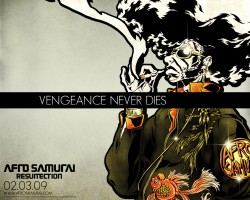
I may speak on Afro (and Ninja Ninja) later this month, but Afro Samurai kind of exemplifies something I love about black, or rap, culture. It’s universal. It went from being something that wouldn’t last twenty years to one of the most dominant forms of music on the planet. Who did Britney Spears, all-american girl, go to when she wanted a hit? Timbaland and Pharrell. Rap has infested pop and dance music to an amazing level.
Looking fresh is still a huge part of rap culture and one of the biggest meccas for streetwear fashion is… Tokyo. I spent a week in Tokyo back in October and man, I could’ve spent thrice what I did on clothes and sneakers. I came home with two different books that were basically sneakerhead fetishism. Kids in fitted Yankees New Eras hit me with the head nod as I walked past and I bonded with these two dudes who didn’t speak a word of English other than “B.I.G.” and “Nas.” I used to live in Spain, I’ve been to France, and found rap fans in both places.
It’s worldwide, and that’s a beautiful thing. People talk about Obama getting elected as if it was the end of racism. Well, that’s dumb. Obama being president isn’t going to change racism. But, right now, there are whole countries full of kids growing up in and around black culture, repping it like it was their own. In a way, they have made it their own by accepting it and modifying it to fit their own culture. These kids identifying and learning from each other because they have that common ground… that’s where post-racialism is going to come from. Not from one man doing one thing. It’s going to come from sharing cultures.
It’s not going to be a flip of a switch. It’s not going to be as easy as declaring “mission complete!” or just up and deciding that we’re post-racial. There’s got to be give and take and push and pull and just something deeper than mere co-existing before post-racialism happens. This is part of why I think that having the two biggest superhero comics out actually represent their audience, and real life, is vital.

